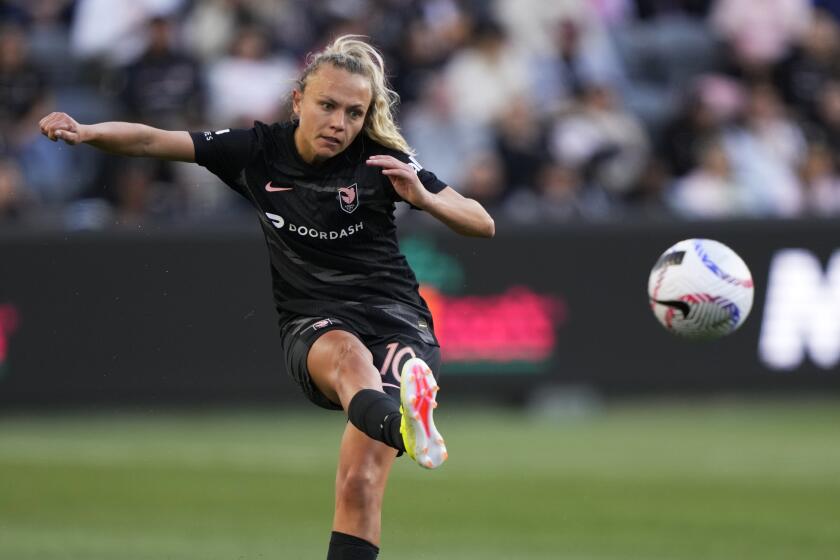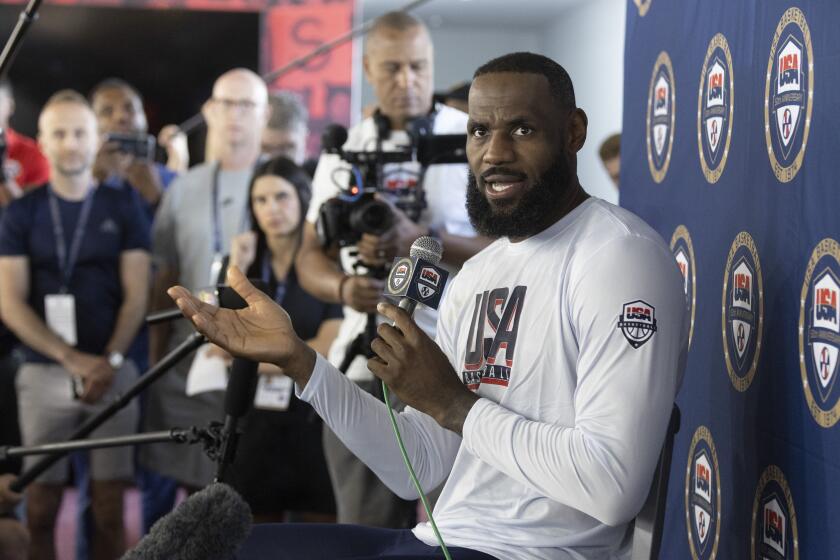THE STEINBRENNER DECISION : Owner Must Give Up Control : Baseball: Commissioner Vincent orders Steinbrenner to resign as general partner of the Yankees by Aug. 20 for making $40,000 payment to a gambler in the Winfield case.
Fay Vincent, commissioner of baseball, ruled Monday that New York Yankee owner George Steinbrenner had not conducted himself in the best interests of baseball and barred Steinbrenner permanently from the day-to-day operation of the club.
After nearly 12 hours of negotiation with Steinbrenner and his attorneys, Vincent announced that Steinbrenner would be stripped of his position as general partner of the Yankees and ordered to reduce his financial interest below 50% because of his dealings with a known gambler. A new general partner is to be appointed by the club’s 19 partners and approved by Vincent.
Vincent said the ruling, effective Aug. 20, is permanent and per the agreement not subject to appeal. And in what appeared to be a negotiating exchange, Steinbrenner has agreed not to challenge Vincent’s decision in court.
“(Steinbrenner) is considered to be the equivalent of placed permanently on the ineligible list, which means he cannot have any activity in baseball, other than subscribed in this agreement,” Vincent said at a news conference. “I did not order him to sell, but what I have done is change his ownership interest from a general partnership interest to a limited one, and I have removed him from having any involvement in the management and operation of the Yankees.
” . . . With my approval, he may consult upon and participate in major financial and business decisions of the New York Yankees solely in his capacity as limited partner.”
Vincent reiterated that Steinbrenner cannot be involved in player transactions or the running of the team. The decisions he may be involved in are relatively few and specific. They include negotiating television contracts and the Yankee Stadium lease with the city.
Steinbrenner barely commented on the decision.
“I am very happy it was resolved,” he said. “I am very satisfied with the resolution, and that is all I am going to say.”
Steinbrenner currently owns 55% of the Yankees. The new general partner must own an interest, but it can be as little as 1%.
Vincent deliberated for three weeks before handing down a decision on Steinbrenner’s relationship with Howard Spira, a self-described gambler and former employee of the David M. Winfield Foundation, although Winfield denies that Spira ever worked for the charitable foundation. On March 20, Vincent began an investigation based on published reports that Steinbrenner had paid Spira $40,000 in January for information on Winfield and his foundation. “An owner of a major league baseball club may not pay a gambler for information intended to be used in a dispute involving the owner and a ballplayer,” Vincent wrote in a summary of his decision.
Spira is under federal indictment on charges that he tried to extort money from Steinbrenner and also threatened him and Winfield.
Steinbrenner’s son, Hank, 33, will be proposed as the new general partner, Steinbrenner’s attorney Stephen Kaufman said Monday night.
Vincent had earlier acknowledged that possibility, but said if the general partner was a member of Steinbrenner’s family, severe restrictions would be imposed on the ways Steinbrenner could deal with that person.
“Mr. Steinbrenner may have no involvement in the management of the Yankees,” Vincent said. “If a member of the family were to be found to be dealing with Mr. Steinbrenner in a way that violated the agreement, the member of the family would be subject to expulsion from baseball.”
Deputy Commissioner Steve Greenberg added: “Anybody in baseball who deals with Mr. Steinbrenner now is in peril. Anybody in baseball who violates this decree jeopardizes his baseball life.”
Vincent’s ruling also bans Steinbrenner from attending baseball games other than as a patron who buys a ticket and sits in the stands. Next spring, Steinbrenner can seek Vincent’s approval in writing to attend some games under other circumstances, as a guest of other club owners, for instance.
Vincent’s ruling was greeted with a 90-second standing ovation by fans attending a game at Yankee Stadium--the Yankees are currently in last place in the American League East, 15 games behind--but there was dismay expressed in the organization.
“I am absolutely shocked at the severity, “ said Pete Peterson, Yankee general manager. “The man (Steinbrenner) has his faults, but he has done a lot of good things. He has done a lot for baseball and especially for baseball in New York for the Yankees.”
Steinbrenner arrived at the commissioner’s office shortly after 9 a.m. Monday, accompanied by Kaufman. Vincent said he then told Steinbrenner of his findings and issued a sanction. Steinbrenner, however, countered with another proposal, and negotiations ensued. Vincent said that the result was an alternative equivalent to his initial ruling.
“There were a couple of other alternatives,” Vincent said. “Obviously, suspension was considered by me, but the opinion makes clear I did not consider expulsion.”
Vincent would not elaborate on that statement.
Vincent is given the power to investigate anything that is not in the best interests of baseball, according to major league baseball’s Rule 21. He is also empowered to levy a fine up to $250,000 and can suspend any baseball personnel for as long as he chooses. Vincent can force an owner to sell his team or in this instance, reduce the amount that he owns.
In testimony July 5-6, Steinbrenner told Vincent that he paid $40,000 to Spira because he was afraid that Spira might harm either Steinbrenner or his family. He also said that Spira threatened to expose information about two former Yankee employees Steinbrenner accused of stealing.
Steinbrenner also said that Spira threatened to expose the alleged gambling habits of Lou Piniella, former Yankee manager.
Vincent later said that Piniella was not the subject of any investigation and dismissed any implications regarding gambling by him.
In his summary, Vincent said: “I sat through the two days of Mr. Steinbrenner’s testimony and I am able to judge the degree of candor and contrition present in this case. I am able to discern an attempt to force explanations in hindsight onto discomforting facts. And I am able to evaluate a pattern of behavior that borders on the bizarre.”
It was Steinbrenner’s stormy relationship with Winfield that ultimately got him in trouble. Steinbrenner signed Winfield to a 10-year contract in 1980 that the Yankee owner thought was worth $17 million. But Steinbrenner had overlooked a cost-of-living clause that made the contract worth $23 million.
Winfield agreed to renegotiate, but a tone of confrontation had been established.
In 1988, Steinbrenner began investigating the Winfield Foundation, to which he was under contract to contribute $300,000 annually. Steinbrenner put his money in escrow during the investigation.
After a series of lawsuits and countersuits, the matter was settled in September, apparently in part on information that Spira had gathered for Steinbrenner. Winfield was forced to make back payments of $229,667 and $30,000 for inappropriate business expenses. Winfield also had to admit some impropriety. Steinbrenner than released the $600,000 that had been in escrow.
Steinbrenner, who owns Florida-based American Ship Building Co., and 15 partners bought the Yankees from CBS, Inc. on Jan. 3, 1973.
And from the beginning, there was controversy. In 1974, then-commissioner Bowie Kuhn suspended Steinbrenner for two years for making illegal political contributions to Richard Nixon. Steinbrenner had pleaded guilty to the felony charge in Cleveland federal court. The baseball sentence was later reduced to 15 months.
In the next several years, Steinbrenner was fined by baseball for tampering with Brian Downing of the Angels and Billy Cannon, Jr., an amateur player. He was also fined and suspended for remarks about umpires in 1983 and later that year was fined for remarks about Jerry Reinsdorf, a co-owner of the Chicago White Sox.
And finally this year, Steinbrenner was fined $25,000 and forced to pay $200,000 to the Angels for tampering in Winfield’s trade to the Angels.
STEINBRENNER WITH THE YANKEES
Notable dates of George Steinbrenner’s career since he purchased the New York Yankees on Jan.3, 1973:
Jan. 3, 1973--Headed group that purchased New York Yankees from CBS Inc. for 10 million.,$3.2 million less than CBS paid for the team in 1964 and 1965.
April 15, 1974--Fifteen-count indictment handed up in Cleveland federal court for violations of election laws. Maximum penalties if convicted total 55 years in prison and $110,000 in fines.
April 19, 1974--Entered not guilty pleas to all 15 counts.
Aug. 23, 1974--Entered guilty plea to one count of conspiracy to make illegal campaign contributions.
Aug. 30, 1974--Fined $15,000 by Cleveland federal court.
Nov. 27, 1974--Suspended by baseball commissioner Bowie Kuhn for two years because of guilty plea.
March 1, 1976--Suspension lifted after 15 months because of good behavior.
Nov. 11, 1979--Fined $5,000 by Kuhn for tampering with Brian Downing of the Angels.
June 26, 1980--Reprimanded by Kuhn for tampering with free-agent amateur player Billy Cannon Jr.
April 19, 1983--Fined $50,000 by Kuhn for remarks during March 25 exhibition game questioning the integrity of National League umpires in general and Lee Weyer specifically.
May 31, 1983--Suspended for one week (June 3 to 9) by American League president Lee MacPhail for statements made May 27 questioning the integrity of umpires Derryl Cousins and John Shulock.
July 3, 1983--Fined $5,000 by Kuhn for remarks about Chicago White Sox co-owner Jerry Reinsdorf.
Dec. 23, 1983--New York Yankees fined $250,000 by Kuhn and ordered to pay $50,000 in legal fees because of Steinbrenner’s actions and statements regarding the “pine-tar” game.
July 5, 1990--New York Yankees fined $25,000 by Commissioner Fay Vincent and order to pay $200,000 to the Angels for tampering with the May 11 trade of outfielder Dave Winfield to California.
July 30, 1990--Commissioner Fay Vincent announced that Steinbrenner must resign as general partner by Aug. 20 for dealings with self-described gambler Howard Spira. Steinbrenner agreed not to contest the decision in court.
STEINBRENNER RESTRICTIONS
The details of the restrictions against the New York Yankees’ principal owner will be released today by the baseball commissioner’s office. This is what already is known:
WHAT HE CAN DO
He may “consult upon and participate in major financial and business decisions of the New York Yankees solely in his capacity as a limited partner” with the permission of the baseball commissioner. Stephen Greenberg, the deputy commissioner, said player signings, free-agent contracts and hiring and firing the manager would not be considered “major” decisions.
He may request permission in writing to attend a limited number of major league games beginning next season.
WHAT HE CAN’T DO
He may not attend, vote or participate in major league meetings.
He may not make personnel decisions.
He may not own 50% or more of the team’s stock. He has six months to get below 50%.
LIMITED AND GENERAL PARTNERS
George Steinbrenner must resign as a general partner of the New York Yankees by Aug. 20, when someone will be appointed to take his place. At that time, Steinbrenner will become a limited partner. The distinction is clear in the business world. This is how Barron’s Dictionary of Finance and Investment Terms explains the difference.
General Partner: . . . managing partner of a limited partnership, who is responsible for the operations of the partnerships and, ultimately, any debts taken on by the partnership. The general partner’s liability is unlimited. In a real estate partnership, the general partner will pick the properties to be bought and will manage them. . . . In return for these services, the general partner collects certain fees and often retains a percentage of ownership in the partnership.
Limited Partnership: . . . made up of a general partner, who manages a project, and limited partners, who invest money but have limited liability, are not involved in day-to-day management, and usually cannot lose more than their capital contribution. Usually limited partners receive income, capital gains, and tax benefits; the general partner collects fees and a percentage of capital gains and income.
More to Read
Get our high school sports newsletter
Prep Rally is devoted to the SoCal high school sports experience, bringing you scores, stories and a behind-the-scenes look at what makes prep sports so popular.
You may occasionally receive promotional content from the Los Angeles Times.






